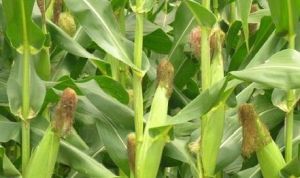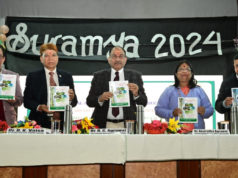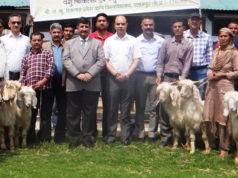Palampur: The CSK H.P. Agriculture University and M/s Nutranta Seed Private Limited, Hyderabad has signed memorandum of Agreement for the multiplication of seed of maize hybrid ‘Palam Sankar Makka 2′ and Rye grass variety Him Palam Rye Grass 1’, developed and released for cultivation by the University.

Palam Sankar Makka-2, a medium maturity, high yielding single cross hybrid of maize is suitable for cultivation in low and mid hill regions of Himachal Pradesh. The colour of the grains of this hybrid is yellow orange. Hybrid has been developed from two inbred parents namely BAJIM 0826 (female) and BAJIM 0827 (male). The hybrid is medium in height with thick stem, resistant to lodging, moderately resistant to turcicum leaf blight and maydis leaf blight.
Him Palam Rye Grass-1, variety of rye grass is suitable for cultivation during Rabi season in the states of Himachal Pradesh, Uttarakhand, Punjab and J & K. This variety produces high yield of quality fodder during winter months in 4 to 5 cuts and production is very high where irrigation facilities are available. This variety is highly resistant to powdery mildew, tolerant to cold and frost.
As per agreement inbred lines of maize hybrid and breeder seed of rye grass will be supplied each year by the University to the company. The seed will be multiplied by the company using its own resources and will be marketed and supplied to the farmers. The main aim of this agreement is to enhance the availability of quality seed of improved varieties to the farmers with a view to increase maize production as well as fodder production on their fields.
Another Memorandum of Agreement has been signed between Durga Seeds Farm, Mandi and the University for the Seed Multiplication of garden pea variety ‘Him Palam Matar-1(DPP-SP-22)’. The main objective of MOA is to provide license of seed multiplication so that quality seeds reach the farming community to a larger extent and in turn, farmers get better production and remuneration. The company will sell the seeds in its original name as ‘Him Palam Matar-1’ which will help in increasing the visibility of University research at different levels.
‘Him Palam Matar-1’ is adopted for cultivation during the main season in high, mid and low hills of Himachal Pradesh. The variety has medium growth habit, flower a week earlier than ‘Pb-89’ and about two weeks over ‘Azad P-1′. It has synchronized flowering. The main features of this variety on consumers’ point of view are its long pods (10-12 cm), lush green and attractive colour, 8-12 seeds per pod (average around 10 seeds) with 50 percent shelling. It is moderately resistant to powdery mildew disease. Average yield is about 140-165 quintal per hectare which is about 7-10 percent higher than ‘Pb-89’ and about 10-15 percent higher than ‘Azad P-1’.














